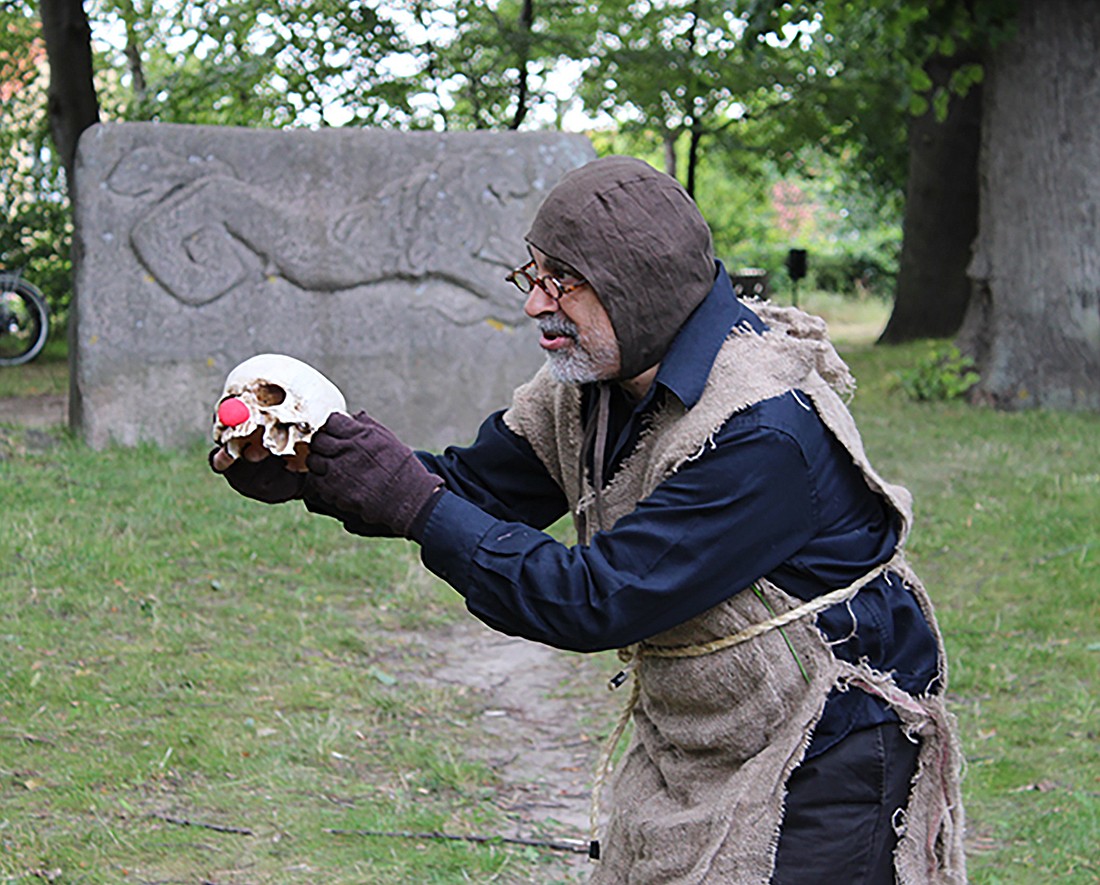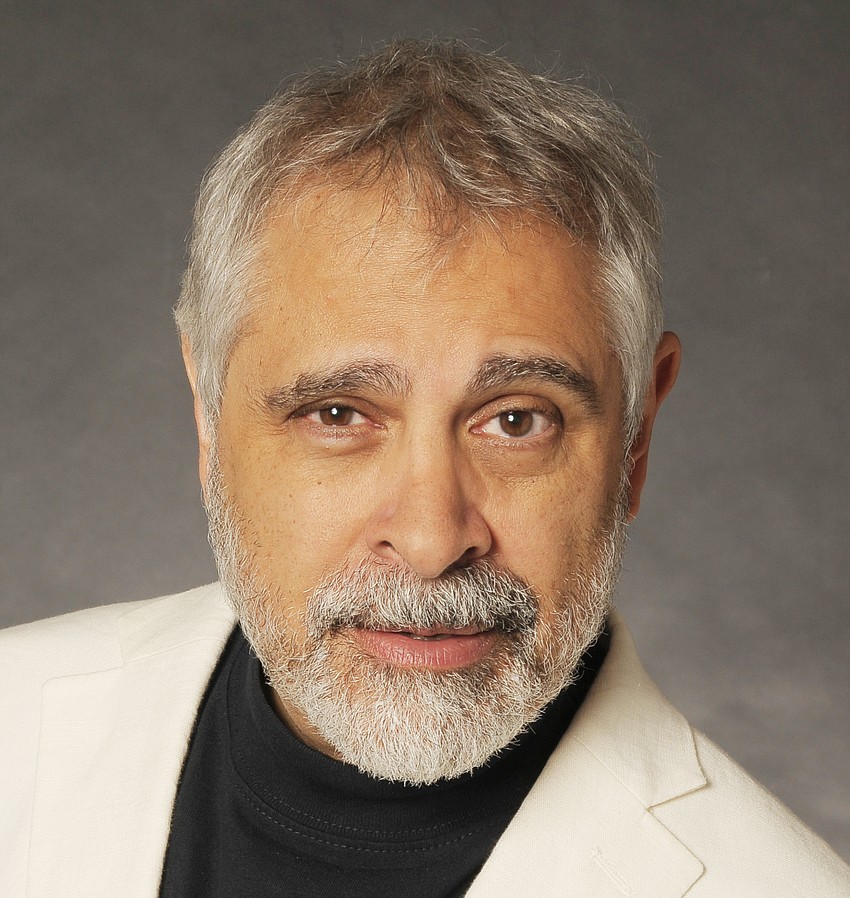- May 10, 2025
-
-
Loading

Loading

Would a playwright by any other name be as beloved as William Shakespeare?
It's a question raised by a new book by Shakespeare actor and director Ron Destro. In "The Starre, the Moone, the Sunne," Desto weaves a murder mystery that posits that a certain Gentleman of Stratford wasn't the author of plays like "Romeo and Juliet," "Hamlet" and many others. In fact, in Destro's book, the man considered by many to be the greatest author in history wasn't even from Stratford-on-Avon.

Scholars have been scrutinizing the works of Shakespeare in an effort to discover whether they were all written by the same person and who the real author is. Is it all much ado about nothing?
Find out for yourself when Destro, who divides his time between London and Florida, comes to Bookstore1Sarasota on Oct. 23 to talk about his book and sign copies of "The Starre, the Moone, the Sunne."
We asked Destro how he ended up becoming a "Shakespeare Wallah," to crib from the Merchant-Ivory film of the same name, and explore whether there's such a thing as "too much of a good thing" when it comes to Shakespeare. Spoiler: No.
When I was a young actor, I was a bit daunted by Shakespeare, not understanding the language. Then I worked with an actor/director named Gibby Brand, who performed Launce’s dog speech from "Two Gentlemen of Verona." Gibby was brilliantly funny, I could understand it, and from then on I was hooked!
I run the nonprofit New York and London-based Oxford Shakespeare Company, which performs the plays in their historic locations. One summer, we presented "Henry V" as a biting commentary on the futility of Henry’s vainglorious war in France. I directed and acted the role of Salisbury on what had been the battlefield at Agincourt. We were the first to ever perform there, and under that sacred ground still remain the bodies of over 6,000 French and English soldiers, to whose souls we publicly dedicated our performance. And I’ll never forget running through the field shouting with sword in hand, and sensing what it was like for those poor human beings caught up in that bloody battle 600 years ago.
I’ve had great mentors, from Lucille Ball to F. Murray Abraham. I started acting at the age of 8, and went to the University of Southern California School of Drama. I moved to Hollywood to become rich and famous, but then I stumbled into a bit of luck. John Houseman, who ran the Juilliard Drama Program, came to reorganize our department. Working with Mr. Houseman, I soon realized it was better to become a good actor than to be rich and famous. I joined a one-year American program with the Royal Academy of Dramatic Art in London. From then on, I knew I wanted to master Shakespeare.
I was studying one summer at Columbia University with one of the world’s greatest Shakespeare voice teachers, Kristin Linklater. And like Mark Twain, Walt Whitman and John Gielgud, Kristin doubted that the plays were written by the man from Stratford-upon-Avon. I soon began to research the topic and came to the conclusion that they were right. And so I’ve been studying and lecturing on the topic for 25 years.
I thought I’d try my hand at writing a novel. And although it touches on the Shakespeare question, I wanted it primarily to be a good Elizabethan murder mystery, full of intrigue and humor, the solving of which just happens to reveal the identity of the real William Shakespeare.
It is also a story about fathers and sons. I have the privilege of being the father of a terrific son, Nicholas. He is a big inspiration to me.
In 1624 London, a brave printer is executed, a portly poet kidnapped, a Stratford-upon-Avon grave is emptied, King James is put into a panic, many swashes are buckled, and things are never as they seem, all because brave Nicholas and clever Valentina are about to discover and reveal the true identity of “William Shake-speare.”
This is a timely tale that touches on the powerful love of fathers, the perils of the plague, the joys of turnips and the mysterious life and tragic death of the Bard of Avon. It is a (mostly) true story filled with suspense and humor.
Sir Derek is perhaps our finest living Shakespearean, and he generously conducted masterclasses for our Oxford Shakespeare Company, two sessions of which are transcribed in my book, "The Shakespeare Masterclasses." Since Derek is one of many actors who doubts the Stratford story, I asked if he would read the book to provide a blurb for the cover. After he reviewed the book favorably, I then asked if he would narrate the audiobook. He graciously agreed, and I couldn’t be happier with the results.
I suppose because I have been acting and reading Shakespeare for so many years, I have a good ear for that particular voice. But I wanted to be very careful to keep the book in period without making it difficult for a modern reader to appreciate it.
For tragedy, it’s" Hamlet," probably because it’s so truthful. And I know that because, having studied the authorship question, it is the most autobiographical play. For comedies, I love "Twelfth Night" and "As You Like it." I tend to play the clown parts, and the best ones are in those plays.
His plays have lasted because he is so universal. He writes about the things we all feel, like love and jealousy and remorse. He has expressed every thought every human has imagined, yet he expresses it better than any of us can.
Whoever Shakespeare was, and I don’t believe he was the man from Stratford, he had such a unique voice that, with the exception of a few scenes that were later added by other writers like John Fletcher after he died, I think he wrote all of the plays and poems attributed to the name William Shake-speare, plus a few more plays that went uncredited.
I think whatever makes the works more accessible to different groups of people, it’s a good thing.
When I stage a play, I am totally color-blind in my casting. And, simply because there are always more actresses than actors, I often cast women in male roles. In movies, the audience won’t accept this, but in a Shakespeare play, it’s easier to suspend our disbelief.
So many people get turned off by Shakespeare simply because there are so many bad productions. With the internet, it’s now possible to see online presentations by actors from Shakespeare’s Globe, The National Theatre or the Royal Shakespeare Company. It’s important to see the best players in order to appreciate the best playwright.
I’d like to see the true story of Shakespeare on film. That’s for any producers out there who might want to turn my book into a Netflix series!